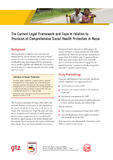Please use this identifier to cite or link to this item:
https://hdl.handle.net/20.500.14356/715Full metadata record
| DC Field | Value | Language |
|---|---|---|
| dc.contributor.author | GTZ/GFA Consulting Group GmbH | |
| dc.date.accessioned | 2012-12-30T21:32:09Z | |
| dc.date.accessioned | 2022-11-08T10:18:53Z | - |
| dc.date.available | 2012-12-30T21:32:09Z | |
| dc.date.available | 2022-11-08T10:18:53Z | - |
| dc.date.issued | 2009 | |
| dc.identifier.uri | http://103.69.126.140:8080/handle/20.500.14356/715 | - |
| dc.description.abstract | Background: Social protection in health is a key instrument to address poverty, income security and access to health services. Its aim is to provide access to health services at an affordable cost. Some degree of basic social protection in health is possible and affordable in any country, but to be effective it requires political will and a strong legal framework. Provision of social protection is challenging in the context of Nepal. In Nepal, around one third of the population lies below the poverty line. According to a report of the ILO (2004), only 45 percent of house-holds have access to basic health care. Nearly 80 percent of the total labour force is engaged in the agriculture sector, 3 percent in manufacturing industries and 17 percent in service sector. | en_US |
| dc.language.iso | en_US | en_US |
| dc.publisher | GTZ/GFA Consulting Group GmbH | en_US |
| dc.title | The Current Legal Framework and Gaps in relation to Provision of Comprehensive Social Health Protection in Nepal | en_US |
| dc.type | Technical Report | en_US |
| Appears in Collections: | Post Graduate Grant (PG) Reports | |
Files in This Item:
| File | Description | Size | Format | |
|---|---|---|---|---|
| Legal_Framework_SHP_Policy Brief.pdf | Research Report | 318.03 kB | Adobe PDF |  View/Open |
Items in DSpace are protected by copyright, with all rights reserved, unless otherwise indicated.
